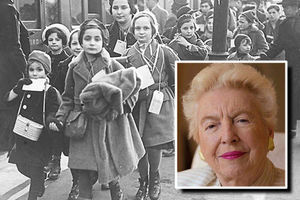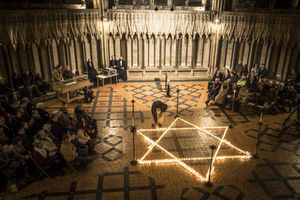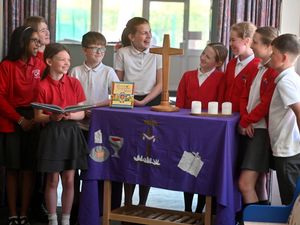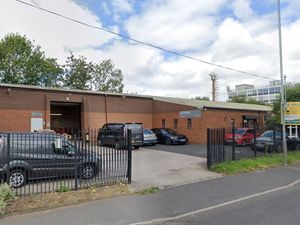From Dortmund to the West Midlands in 1939: How Kindertransport saved my life
As the world marks Holocaust Memorial Day 2017, businesswoman Dame Stephanie Shirley recalls how the Kindertransport saved her life.

"At the time I didn't understand why I was being sent like a parcel with a label to a strange country, with strange people and a strange language.
"But I know because of that I survived, when others didn't. I think I have spent my life making sure that it was worthy of that survival."
As the world marks Holocaust Memorial Day, these are the words of Dame Stephanie Shirley who managed to escape the horrors of the Nazis, by securing a place on a Kindertransport, and make a new life in the West Midlands.
She has achieved enormous success in her career and charity work and admits that a lot of her determination comes down to her survival against the odds when she was aged just five.
MORE: The Black Country marks Holocaust Memorial Day 2017

Now 83, the businesswoman and philanthropist, told her extraordinary story to students and staff at the University of Wolverhampton yesterday, at their Holocaust Memorial Day Annual Lecture.
She recalled early warning signs as the persecution of Jews increasingly began to affect her family in Germany, first against her father Arnold Buchthal.
"We were living in Dortmund and my father was a judge, so we lived a kind of bourgeois existence. But suddenly he was told he had lost his job. I still have the letter telling him because it was against 'regulations'.
"Because of my age I only remember childish things, like we weren't allowed to sit in the park, and that we moved a lot. I think we ended up moving about seven times to different places in Germany and Austria. We finished up in Vienna which was very anti-Semitic, but we had family there."
As the violence against the Jews stepped up, her parents took drastic action to protect Stephanie and her older sister Renate.
In response to the notorious Kristallnacht when the Nazis went on rampages torching synagogues, smashing Jewish homes, schools and businesses, and killing members of the community, the British had eased immigration restrictions for Jewish refugees.
A daring rescue effort was organised in which Jewish children were brought to the UK on trains, in what was known as the Kindertransport.
Stephanie and Renate's mother set about doing everything she could to make sure her girls were on board.
"It was really difficult to get a place. My mother resorted to putting us into a children's hostel so she could focus on rushing around getting all the papers we needed.
"I think they deliberately made the paperwork and bureaucracy as difficult as possible. We didn't understand at the time why she was doing it, but now I know she saved our lives."

It is estimated that the Kindertransport rescued nearly 10,000 Jewish children from Nazi-occupied countries.
Stephanie and Renate left on July 6, 1939, on a two-day journey via Holland that would take them to Liverpool Street Station in London.
"I was five and I was clutching the hand of my nine-year-old sister. If you can imagine the train, there were 1,000 children packed on to it, and just two adults.
"Some of us had to sleep in the luggage racks – my sister doesn't remember this but I do. And I remember the silly things that children do; that there was a little boy who kept being sick, and that I lost my doll.
"There were also young girls who took care of us, including some babies. They were very brave, because these girls had to then go back, and I don't know if they survived. I would like to honour them."
On arriving in England the sisters were taken to their new home with foster parents Gary and Ruby Smith, in Little Aston, Sutton Coldfield.
Dame Shirley describes her foster family as 'lovely', but she had to overcome a language barrier to settle into her new home and at St Paul's Convent School.
"I didn't know any English. We had learned the odd words with our family but things like 'combustion stove' weren't very useful."

While her parents survived and later joined the girls, they never told them of the sufferings they had endured, and after their time apart they never truly bonded as a family again.
Dame Stephanie went on to grow up in Oswestry, and at 12 she went to Oswestry Girls High School, where she discovered a love of maths and science.
Determined to succeed, she set up her own IT business and offered part-time employment to professional women with dependants.
The IT business, later known as Xansa which became part of the Sopra Steria Group, prospered, and Dame Stephanie earned her fortune.
Yet she has devoted her life to donating much of her wealth to charity, particularly those centred on autism, after her own son Giles was diagnosed with the condition, before his death, aged 35, in 1998.
She went on to found The Shirley Foundation and her own charity Autistica to fund research and support, with the proceeds from her memoir Let It Go, going to this cause.
She was made a dame in 2000, and in 2013, she was named as one of the 100 most powerful women in Britain by Woman's Hour.
Now living in Henley-on-Thames, she was delighted to return to the West Midlands to talk to students at the University of Wolverhampton about her experiences, even turning down an invitation to Number 10 to be there.
"It's great to be part of the Holocaust Memorial Day, and I enjoy talking to the younger generation, who are always interested in our experiences," she said.




